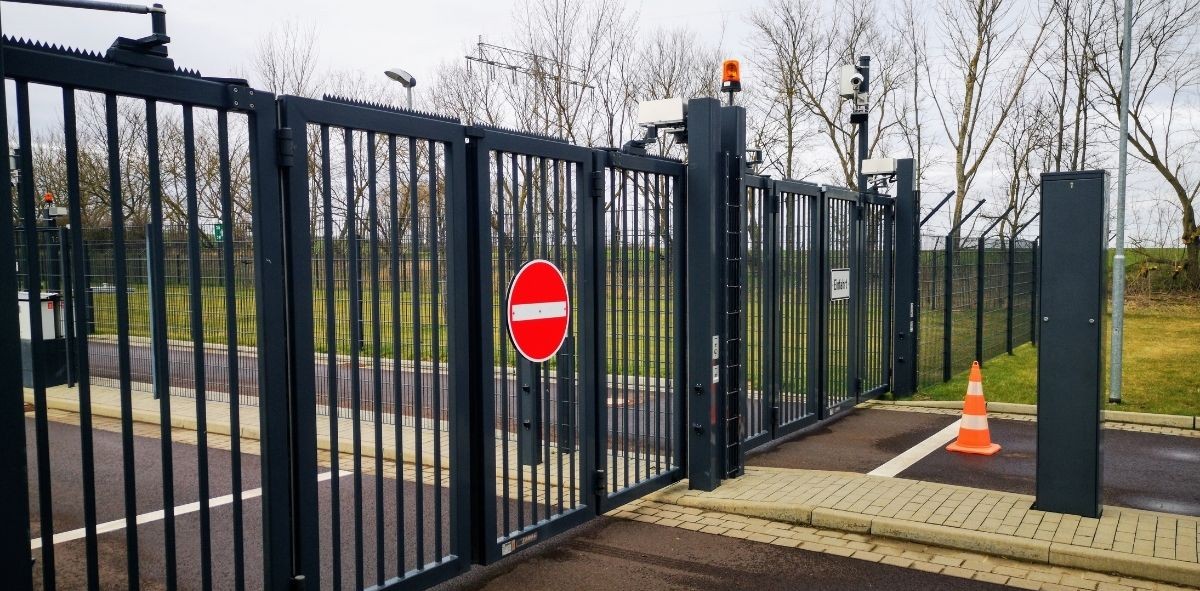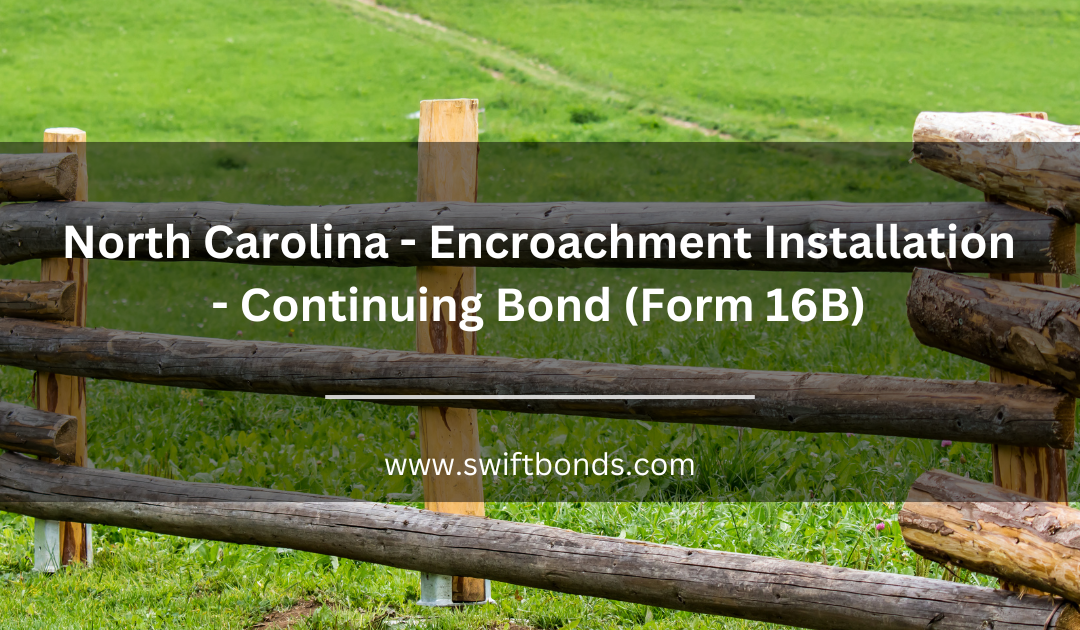Get an Instant Quote on Encroachment Installation – Continuing Bond (Form 16B)
Introduction
From our perspective, contractors who regularly perform installations along North Carolina’s highways or right-of-way areas know how critical it is to comply with state permitting requirements. Whether installing utilities, traffic signals, pipelines, or curb infrastructure, you need approval from the North Carolina Department of Transportation (NCDOT)—and that approval often hinges on posting a bond.
The North Carolina – Encroachment Installation – Continuing Bond (Form 16B) offers a proactive solution. Unlike one-time bonds tied to individual jobs, this continuing bond allows qualified contractors to perform multiple installations under a blanket encroachment permit. It’s a cost-effective way to maintain compliance with NCDOT without the paperwork hassle each time a project begins.
The bond guarantees that the contractor will restore the affected areas to their original or improved condition and follow all engineering and safety standards. If the contractor fails, the bond gives the state recourse to correct the work at the bondholder’s expense—just as the North Carolina – Loan Broker ($10,000) bond does in the financial sector.
Where Contractors Often Get Confused About Form 16B
We’ve noticed that many contractors mistakenly assume their general liability insurance is enough for encroachment work. Others think they must post a separate bond for every job. That’s where confusion sets in—and delays begin.
The Form 16B Continuing Bond is designed specifically for contractors who need recurring access to state-maintained property. It’s a long-term financial assurance tool, not a permit substitute or insurance product.
In fact, it functions very differently from the North Carolina – Credit Repair Service ($10,000) bond, which protects consumers against deceptive practices. Form 16B is geared toward protecting public infrastructure from damage or neglect after work is done.

How Swiftbonds Helps Contractors Secure Form 16B Quickly
Based on our experience, working contractors don’t have the time to comb through NCDOT regulations or decipher confusing bond forms. That’s why Swiftbonds streamlines the process.
We understand the requirements of Form 16B and how to package a bond that NCDOT will accept without revisions. We offer electronic or overnight delivery of signed and sealed bonds, quick approvals, and competitive rates.
For contractors working on multiple utility or development projects statewide, this bond eliminates the need for repeat paperwork and allows faster mobilization. It’s just as efficient as our bonding process for financial professionals needing the North Carolina – Loan Broker ($10,000) bond.

What Contractors Need to Do to Get the Continuing Bond
What we’ve discovered is that contractors benefit from a step-by-step approach to meet the Form 16B requirement with confidence:
- Step 1: Verify eligibility for the continuing bond with NCDOT’s Division of Highways.
- Step 2: Contact Swiftbonds to begin your bond application, which typically requires basic company information and financial data.
- Step 3: Get a bond quote and approval—usually within one business day.
- Step 4: Receive your executed Form 16B bond and submit it to NCDOT along with your general encroachment application.
- Step 5: Begin work across multiple projects statewide without needing separate bonds.
This plan saves both time and compliance effort over the long term.

Why Filing the Bond Early Matters in North Carolina
We’ve found that delays in filing Form 16B often translate to halted projects or revoked permits. NCDOT does not allow installation activity without this bond in place—regardless of contract value.
Whether you’re installing a waterline or signal conduit along a right-of-way, NCDOT requires immediate proof that the contractor is financially accountable. Filing early not only ensures compliance but also keeps inspection and approval timelines on track.
This urgency mirrors that of regulated industries, where providers must file the North Carolina – Credit Repair Service ($10,000) bond before legally offering services.

Consequences of Skipping the Encroachment Installation Bond
In our observation, skipping the Form 16B bond leads to significant risk. Without it, contractors are not authorized to disturb right-of-way land. Any damage, incomplete restoration, or safety violations could trigger state intervention and cost recovery through other legal means.
In worst-case scenarios, contractors may be blacklisted from future NCDOT work or face penalties under state construction law. It’s not worth jeopardizing your project pipeline or business reputation over a missed bonding requirement.
Just as financial professionals who ignore the North Carolina – Loan Broker ($10,000) bond face license revocation, contractors without this continuing bond risk work stoppages and legal exposure.
Why Bonded Contractors Build Stronger Reputations in the Industry
We’ve learned that contractors who proactively file the North Carolina – Encroachment Installation – Continuing Bond (Form 16B) demonstrate a level of professionalism that wins more work. Public agencies prefer vendors who follow the rules, complete their work, and return infrastructure to like-new condition.
This bond isn’t just a compliance formality—it’s a mark of accountability. When your name appears on file with NCDOT as a bonded contractor, it signals trustworthiness to municipalities, general contractors, and engineers statewide.
This same credibility applies in industries governed by consumer protection laws, such as firms covered under the North Carolina – Credit Repair Service ($10,000) bond.
North Carolina Law and NCDOT Bonding Requirements
In North Carolina, the Department of Transportation regulates all work involving encroachments on public roads, highways, and rights-of-way. Contractors must submit Form 16B—titled “Encroachment Agreement – Surety Bond (Continuing)”—to cover potential damages or restoration costs.
NCDOT administers this requirement under N.C. Gen. Stat. § 136-18, which authorizes the agency to approve encroachments and enforce restoration standards. The bond must remain valid throughout the agreement term and be issued by a surety company licensed in North Carolina.
For official guidance, contractors should review NCDOT’s Encroachment Agreement Guidelines or consult the district engineer in their project’s jurisdiction.
Conclusion
We’ve come to appreciate that the North Carolina – Encroachment Installation – Continuing Bond (Form 16B) offers more than regulatory compliance—it provides contractors with a reliable, reusable bonding solution that speeds up project approvals and builds trust with public agencies.
Swiftbonds makes the process efficient, clear, and fast. Whether you’re a utility contractor expanding operations or a site work specialist seeking new opportunities, this bond unlocks long-term access to North Carolina’s right-of-way projects.
From installation bonds to financial service guarantees like the North Carolina – Loan Broker ($10,000) bond, Swiftbonds is the partner contractors trust.
Frequently Asked Question
What does the North Carolina Encroachment Installation Continuing Bond cover?
We’ve often noticed that this bond guarantees a contractor will repair or restore all public property impacted during encroachment installations, such as road shoulders, sidewalks, or drainage systems.
Who needs to file Form 16B in North Carolina?
We’ve often noticed that any contractor performing recurring utility, signal, or infrastructure installations on NCDOT-maintained roads must file this bond to obtain a general encroachment permit.
Can this bond be reused across projects?
We’ve often noticed that yes, Form 16B allows the contractor to work on multiple encroachment jobs without needing a new bond for each site, as long as the bond stays active and valid.
How long is the Form 16B bond valid?
We’ve often noticed that this continuing bond remains in effect until canceled by the surety or replaced by a new bond. Contractors must maintain it for the duration of their encroachment agreement.
Does this bond relate to other state-regulated industries?
We’ve often noticed that while this bond is specific to NCDOT installations, similar requirements exist in financial services under bonds like the North Carolina – Credit Repair Service ($10,000) bond, which protects consumers against fraud.


